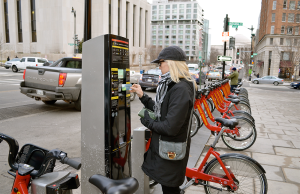
The DDOT launched an initiative to make Capital Bikeshare more affordable for low-income residents in the District.
The District Department of Transportation launched a program to enable low-income residents in Washington, D.C., to receive a yearly membership to the bicycle rental service Capital Bikeshare for as low as $5 on April 13.
Through the new initiative, D.C. residents who use certain social service programs, such as the D.C. Department of Human Services, Back on My Feet D.C., Unity Health Care, Whitman-Walker Health, Community of Hope D.C. and the D.C. Center for the LGBT Community, will be connected with Capital Bikeshare to receive discounted memberships.
The government-run bicycle sharing organization, which has more than 350 stations and serves residents of Washington, D.C., Arlington Country, Alexandria and Montgomery County, typically charges customers $85 for new memberships.
A 2014 Capital Bikeshare survey found more than 50 percent of its customers are white and make an annual income of more than $100,000, despite 50 percent of the District’s population being black and 19 percent living below the poverty line.
The program, similar to others offered in cities like Boston, is intended to reduce barriers low-income individuals face in attempting to use bike sharing programs by not only reducing cost, but also increasing allowed trip time and providing cycling-focused education.
In a press release, DDOT Director Leif Dormsjo stressed the role the Capital Bikeshare community partnership will play in providing residents with an accessible means of getting to and from important engagements.
“It is critical that those with the most need are able to travel quickly and economically to and from their appointments, jobs, training and classes,” Dormsjo said.
Capital Bikeshare Project Manager Kimberly Lucas said Capital Bikeshare will also be providing low-income residents with free helmets and improving program outreach and education.
“By bringing the cost down to $5, we make Capital Bikeshare more accessible for the folks who need it the most,” Lucas said. “In addition, if you’re learning about the community partners program through one of the organizations that you’re already a member of, then you’ll have someone there who can educate you on how Bikeshare works, show you all the safety materials and provide you with a free helmet as well.”
A 2015 study from the National Association of City Transportation Officials indicated low-income residents encounter barriers to bike sharing programs, including a lack of communication between government officials and city residents, a lack of cash payment options for membership and an absence of bike sharing stations in low-income neighborhoods.
“While evidence suggests that the total cost of an annual bike share membership is not an insurmountable barrier for most low-income people, many low-income people have difficulties coming up with the lump-sum payment for annual membership,” the report read.
Arlington County initiated a program in 2015 allowing residents to pay for Capital Bikeshare memberships using cash; however, only ten residents joined the program through the new payment option. Under the District’s new community partnership program, low-income residents who are matched with the service will be able to purchase Capital Bikeshare memberships using community partners’ credit accounts without requiring a credit card themselves.
At $5, the new Bikeshare membership will be cheaper than the discounted weekly Metrobus pass that the Metro system currently offers to senior residents.
Aidan Thaggard (MSB ’19) said that the new Bikeshare initiative would mitigate the negative effects limited transportation options have on lower-income residents seeking to gain or maintain employment.
“I think definitely one of the primary obstacles in lifting oneself out of the vicious cycle of poverty is being able to consistently be available for work,” Thaggard said. “One of the biggest challenges with being available for work is transportation, because obviously public transportation exists but it’s neither perfect nor attuned to exactly where everyone needs to go.”
Liam Flanagan (NHS ’19) said he envisions the Bikeshare initiative as providing an environmentally friendly alternative to other forms of transportation.
“[Capital Bikeshare] is a healthy alternative to other modes of transportation that are not only damaging to the environment but not as specific to the needs of their users,” Flanagan said.




















